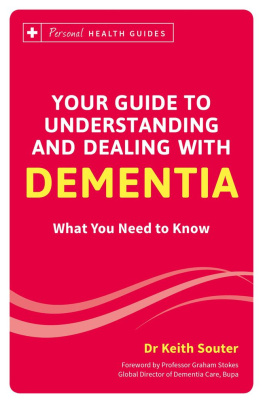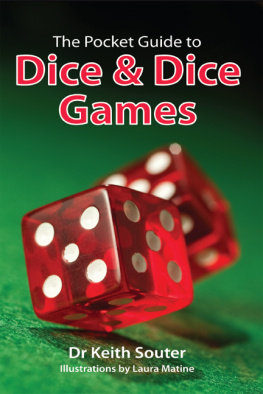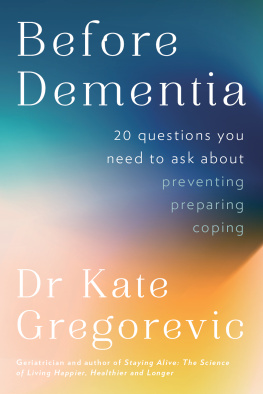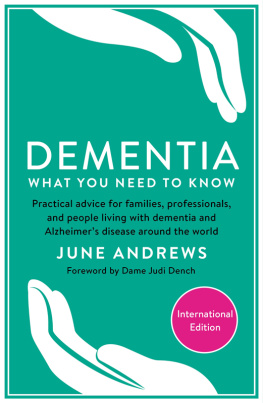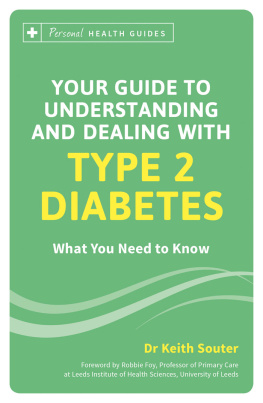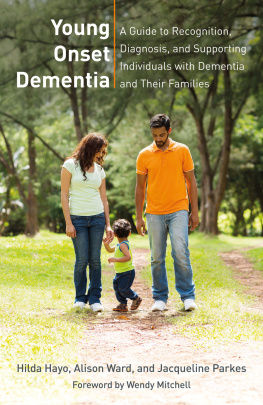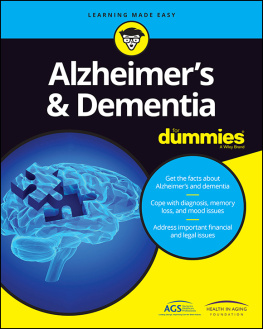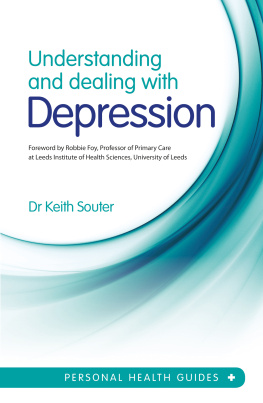Keith M. Souter - Your guide to understanding and dealing with dementia : what you need to know
Here you can read online Keith M. Souter - Your guide to understanding and dealing with dementia : what you need to know full text of the book (entire story) in english for free. Download pdf and epub, get meaning, cover and reviews about this ebook. year: 2015, genre: Romance novel. Description of the work, (preface) as well as reviews are available. Best literature library LitArk.com created for fans of good reading and offers a wide selection of genres:
Romance novel
Science fiction
Adventure
Detective
Science
History
Home and family
Prose
Art
Politics
Computer
Non-fiction
Religion
Business
Children
Humor
Choose a favorite category and find really read worthwhile books. Enjoy immersion in the world of imagination, feel the emotions of the characters or learn something new for yourself, make an fascinating discovery.
- Book:Your guide to understanding and dealing with dementia : what you need to know
- Author:
- Genre:
- Year:2015
- Rating:4 / 5
- Favourites:Add to favourites
- Your mark:
- 80
- 1
- 2
- 3
- 4
- 5
Your guide to understanding and dealing with dementia : what you need to know: summary, description and annotation
We offer to read an annotation, description, summary or preface (depends on what the author of the book "Your guide to understanding and dealing with dementia : what you need to know" wrote himself). If you haven't found the necessary information about the book — write in the comments, we will try to find it.
Your guide to understanding and dealing with dementia : what you need to know — read online for free the complete book (whole text) full work
Below is the text of the book, divided by pages. System saving the place of the last page read, allows you to conveniently read the book "Your guide to understanding and dealing with dementia : what you need to know" online for free, without having to search again every time where you left off. Put a bookmark, and you can go to the page where you finished reading at any time.
Font size:
Interval:
Bookmark:
Acknowledgements
I would like to thank Isabel Atherton, my wonderful agent at Creative Authors, for helping to bring another book in this series to fruition. Thanks also to Claire Plimmer at Summersdale who commissioned this and the previous titles, and to Stephen Brownlee who has guided it through the various stages towards publication. Thanks to my editor, Jennifer Barclay. It was good to work with her again and I am grateful for the many helpful suggestions she made. Thanks also to Julian Beecroft, my copy editor, who helped to smooth out the manuscript, and Vicki McKay, my proofreader. It has been a great pleasure to work with them all.
Finally, a huge thank you to Professor Graham Stokes for taking the time from his busy schedule to write the foreword to this book. I particularly valued his opinion as a clinician and academic working in the field of dementia.
Keith Souter
Appendix
Bereavement
When someone with dementia dies, some carers feel that much of their grieving has happened during the years they have cared for their loved one. This anticipatory grief, as it is known, is common in carers of people with both dementia and those with a terminal illness. There may be a feeling of having to put on a brave face and not showing your feelings to the person with dementia, but that doesnt mean that you should bottle them up entirely. Having a good support network of friends and professionals that you can talk to, such as your GP or dementia nurse, can be of considerable help.
Moreover, every situation and every person being unique, some carers will go through the entire grieving process only once the person with dementia has died. It is useful to look at this, since the death of the person to whose care years may have been devoted may seem to leave a huge hole in the carers life.
The following are the normal stages of grief:
Initial shock
The person cannot accept that their loved one has gone; they may even exhibit the mental mechanism of denial whereby they refuse to believe that the person has died. This shock is often accompanied by emotional blunting, so that the carer does not weep as much as they would expect, or they just cannot cry.
Yearning
This comes after a few days. The person yearns and wants the deceased person to come back. They find themselves filled with memories and images. They want to be close to their things and personal effects. In this period, which can last for a week or two, there is often anger that the person has been taken away, that certain people did not do enough, etc. anger that is usually unjustified. Then there is guilt, as perhaps the person feels that if only they had done certain things the individual would still be with them. There may also be guilt about things that had not been said before the person died.
Despair
This can last a few more weeks. This is the sadness that comes when they realise that the loved one has gone. It is common for people to hibernate, to become apathetic and to feel that life is pointless. But all this will pass.
Recovery
As the main hurting starts to go, the person will begin coming to terms with their loss so that they can start to rebuild their life.
After three months or so the individual can expect to see some return of joy. Watching a TV show may induce a laugh, or a hug from a friend or relative may make them feel better. If not then the grief may have developed into depression. In particular, if the person starts having thoughts about suicide, or if they feel racked with guilt, then they may need help.
Things that may help one to grieve
It is helpful to try to maintain some sense of normality in ones life during grief or loss. People usually offer help initially, but if their help is declined they may not offer it again. One should try not to be reticent but accept help when it is offered and, indeed, not be afraid to ask family and friends.
Try to get into a routine every day. If you fall into a chaotic pattern of life then it is easy to lose purpose, and losing a sense of purpose can result in depression.
Try not to resort to alcohol, as it doesnt help. It is easy to become dependent on it and to develop a habit that ultimately you do not need and which may contribute to any depression.
Accept that the emotions you are feeling are normal, and if you feel like weeping allow yourself to do so. There is nothing wrong with crying.
Look after yourself and make sure that you get some exercise and have regular nutritious meals, both of which will help.
Chapter 1
So what is dementia?
The World Health Organization uses the definition given by the International Classification of Diseases.
Dementia is a syndrome due to disease of the brain usually of a chronic or progressive nature in which there is disturbance of multiple higher cortical functions, including memory, thinking, orientation, comprehension, calculation, learning capacity, language, and judgement. Consciousness is not clouded. The impairments of cognitive function are commonly accompanied, and occasionally preceded, by deterioration in emotional control, social behaviour, or motivation. This syndrome occurs in a large number of conditions primarily or secondarily affecting the brain.
The point about there being no impairment of consciousness is very important, since it can help to differentiate between dementia itself and potentially reversible conditions that may mimic the condition. This will be explained later.
There are over 200 types of dementia, but the most common according to figures from Alzheimers Society are:
Alzheimers disease: the commonest accounts for 62 per cent of cases of dementia
Vascular dementia: the second commonest 17 per cent
Mixed pattern 10 per cent
Dementia with Lewy bodies 4 per cent. It has characteristics of both Alzheimers disease and Parkinsons disease and also Parkinsons disease dementia PDD
Fronto-temporal dementia 2 per cent
Parkinsons disease dementia PDD 2 per cent
Others including Creutzfeldt-Jakob disease, Korsakoffs psychosis, and Huntingtons disease.
Causes of dementia in the UK

KEY POINT
Dementia is NOT a normal part of ageing.
A brief history of dementia
Dementia is not a new condition but has been recognised for centuries. It is instructive to consider how it has been regarded down the years and to see how we have gradually come to understand more about it. Thus we now realise that dementia is merely an umbrella label for a wide spectrum of brain disorders.
Ancient Egypt
The ancient Egyptians left us a great deal of information about their civilisation in tomb paintings and in the many papyri that have been discovered by archaeologists. In 1862, Edwin Smith, a young amateur Egyptologist and adventurer, purchased two papyri in Luxor, said to have been found between the legs of a mummy in the Theban necropolis. Both papyri dated to about 1550 BC, but were thought to be copies of far older texts. One is the oldest-known surgical text in the world, describing surgical instruments and techniques and discussing 48 cases of injuries, including head injuries. The other is a medical text outlining knowledge about medicine and the treatments used for a whole range of conditions.
The Egyptians had hieroglyphics for the brain, the skull, the spinal fluid and the meninges, and the coverings of the brain, as well as for the other major organs. They knew that the brain was needed to control the movements of the body, and they recognised that injury to one side of the brain could result in paralysis of the opposite side of the body.
A beautiful and historically accurate description of ancient Egyptian surgery is given in the 1945 historical novel The Egyptian by the Finnish writer, Mika Waltari. The main character Sinuhe, who would become the royal physician to Pharaoh Akhenaten, is apprenticed to the opener of heads. He shows him how to examine a patient and diagnose where there may be a problem in the head from an assessment of the state of consciousness and the use of the limbs. He then shows him how to remove a piece of skull and replace it with a silver plate, which is bound with bandages while they await recovery.
Next pageFont size:
Interval:
Bookmark:
Similar books «Your guide to understanding and dealing with dementia : what you need to know»
Look at similar books to Your guide to understanding and dealing with dementia : what you need to know. We have selected literature similar in name and meaning in the hope of providing readers with more options to find new, interesting, not yet read works.
Discussion, reviews of the book Your guide to understanding and dealing with dementia : what you need to know and just readers' own opinions. Leave your comments, write what you think about the work, its meaning or the main characters. Specify what exactly you liked and what you didn't like, and why you think so.

